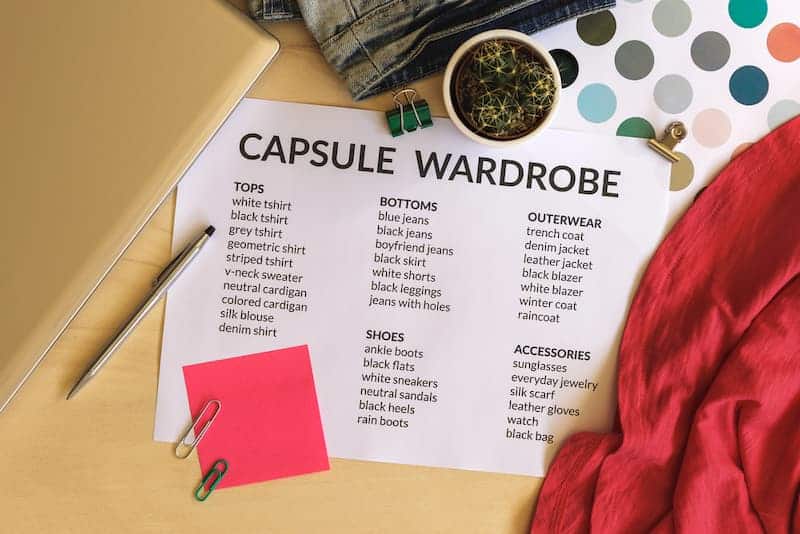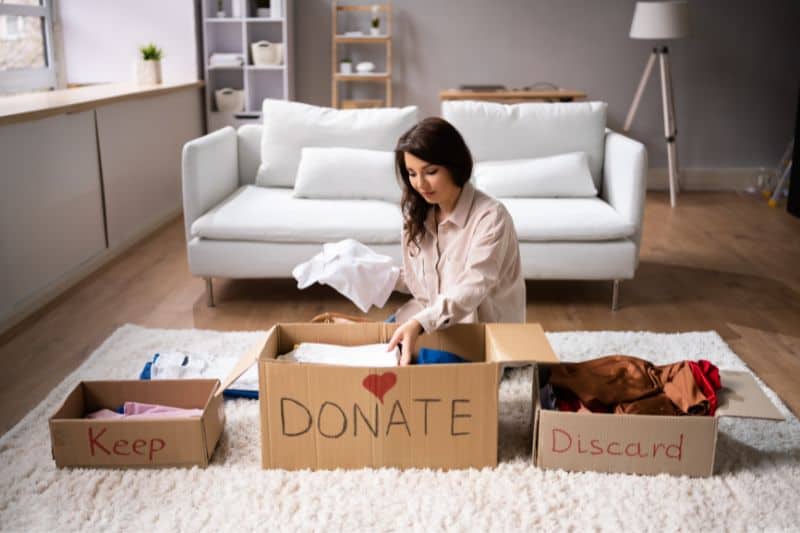Are you considering becoming a minimalist? You’re about to make one of the healthiest moves for your pocket and health — both physical and mental.
But with so many misconceptions about becoming a minimalist, it’s possible to sometimes feel discouraged about your ambition.
This article comes to inspire you and rekindle your desire to become a minimalist. Don’t worry; you must not be rich or sell all your valuables to become one — as we’ve read on the internet!
With a few simple measures, you can embrace minimalism without giving up your style or comfort.
Read: 11+ Items To Get Rid of For a Minimalist Living Room
Here are 13+ tips to help you think and act like a minimalist.
1. Start With Decluttering
The first step towards minimalism is decluttering your space. As revealed in a study, an average home has over 300,000 items!
That’s a lot, right?
But interestingly, not every item goes into use. In fact, most items people keep in their homes are seldom used or “just-in-case” items. This means you can still eliminate most of them without feeling the loss.
So, take time and remove all the unnecessary items from your space. Go through each item, asking yourself, “Do I really need this?” If not, consider donating, giving out, or selling them.
This may take time, so it may take several days or weeks to complete. You can begin by decluttering one area at a time, say, your closet or kitchen. Then, gradually move to other areas until you’ve decluttered your entire space.
2. Embrace the ‘One In One Out’ Rule
Once you’ve removed all the clutter, you must put in effort to ensure that you don’t again accumulate what doesn’t add value to your life. That’s where the “One In One Out” rule comes into play.
This rule is simple: Whenever you bring in a new item, you must get rid of an old one.
Let’s say you got a new pair of shoes. As per the rule, you must find a way to get rid of an old pair that you hardly wear for you to maintain a balance and avoid clutter. You can consider selling, donating, giving out, or recycling them.
It may come with a pinch at first, but it will help you maintain a clutter-free space and save you the hassle of having to declutter in the future.
3. Quality Over Quantity All The Time
Would you rather get one high-quality item that lasts longer or multiple low-quality items that you’ll have to replace frequently?
When switching to a minimalist lifestyle, you just have to work with the former. That’s to say, whatever you buy, ensure that it’s durable, long-lasting, and perfect for the purpose.
Of course, this may mean paying a lot up-front. But when you factor in the item’s value in the long run, you’ll realize that it has a higher payoff than opting for multiple low-quality items.
If you can’t afford to pay for a high-quality item at once, save up until you can — if applicable. It will be worth it in the end.
4. Say NO To Impulse Buying
Let’s face it — in our everyday lives, we’ve all come across something that so easily catches our eyes, and we’re all of a sudden in love with it and ready to reach into our pockets for it.
It could be a new gadget, clothing item, or home decor piece. Whatever it is, the urge to buy impulsively is real.
But do you realize that after we buy it, our interest in it fades away just as quickly as it came?
That’s why you must not fall into the trap of impulse buying. The fact that you didn’t have it figured out at first means you can do without it.
Only buy what you have on your shopping list before heading out to shop. Having a list to guide you on what to buy will save your pocket and ensure that you don’t initiate a new cycle of accumulating clutter in your space.

5. Have a Capsule Wardrobe
As seen in one of our previous articles, building a capsule wardrobe is an easy task. And as a minimalist, having a capsule wardrobe is not an option.
After all, why would you need a closet filled with clothes you hardly wear or that no longer fit you?
Take time to go through your wardrobe. Have a collection of clothes that go well together and can be easily mixed and matched. This type of wardrobe will save you the hassle of choosing what to wear each day and also minimize the number of clothes in your closet.
As long as every top in your wardrobe goes well with every bottom, you no longer have to worry about whether or not your cladding is matching.
6. Digitize Your Life
This especially goes to folks who like to accumulate items like books, CDs, DVDs, and other physical media.
In this digital era, almost everything can be accessed online or through a device. So why not digitize your life?
Why would you still need a physical notebook when there are hundreds of note-taking apps available?
What excuse do you have for stacking all those CDs and DVDs when you can easily access them on streaming platforms?
And for the arid readers, how about getting a digital version of the book instead of accumulating hard copies? It will save you space and bring convenience you can’t find in physical items.
7. Multi-Functionality Over Specialization
Imagine having an item that does the work of several single-use items? It would eliminate the need for having multiple items and save you space, money, and time.
When purchasing new items, consider more than just the quality. Look beyond that and examine the versatility of whatever you want to buy.
For instance, if you need a blender, why not buy one that can do the blending and help in other tasks like food processing? It will save you some money if you need to invest in a food processor.
Of course, that’s just a single example. There are many areas where you can embrace versatility. If you need a laptop and a tablet, for instance, why not buy a convertible device that can serve as both?
Having multi-functional items will not only save you space but also make your life easier and more efficient.
8. Appreciate Experiences Over Material Possessions
Sometimes, we tend to value material possessions more than we do experiences. But as a minimalist, you must switch your mindset and prioritize experiences over things.
Instead of spending money on accumulating unnecessary items, invest in experiences like traveling, trying out new hobbies, spending time with loved ones, or learning a new skill.
These experiences will add more value to your life and bring more fulfillment than any physical item ever could.
And do I even need to say that unlike material possessions, which can easily get lost, damaged, or forgotten, these memories will stay with you forever?
9. Make Good Use of Time
Who said minimalism is all about tangible items? It cuts across every aspect of your life, including how you spend every second that ticks away.
As a minimalist, learn to prioritize and use your time well. This means only engaging in activities that add value to your life and eliminating time-wasting activities.
For instance, why would you need to spend hours scrolling mindlessly on social media when you could use that time for self-development, bonding with loved ones, or pursuing a hobby?
Don’t get me wrong — it’s absolutely okay to relax and unwind, but make sure it’s in moderation and not taking up all your time.
By being mindful of how you use your time, you can not only increase productivity but also have more time for the things that truly bring joy and fulfillment into your life.
10. Build Quality Relationships
As humans, we thrive on social interaction and relationships. And as a minimalist, it’s important to invest in quality relationships that bring positivity and happiness into our lives.
Instead of trying to maintain a large circle of friends or acquaintances, focus on building deeper connections with a few individuals who truly add value to your life. These can be family members, close friends, or even mentors.
By investing in quality relationships, you’ll have a support system during tough times and meaningful connections that bring joy and fulfillment into your life.
11. Practice Gratitude
In our fast-paced world, it’s easy to get caught up in the cycle of always wanting more and never feeling content with what we have. But as a minimalist, practicing gratitude is key.
Take time each day to reflect on the things you are grateful for, whether it be your health, relationships, or simple pleasures like a good cup of coffee. This will help cultivate a mindset of contentment and appreciation for what we already have.
By practicing gratitude, you can also avoid the urge to constantly consume and accumulate more things in search of happiness.
Read: 11+ Common Misconceptions About Minimalism
12. Continuous Evaluation
Minimalism is not a one-time task to be checked off a list but rather an ongoing journey. It’s important to continuously evaluate our belongings, habits, and mindset to ensure they align with our values and bring value into our lives.
This means regularly decluttering your space, re-evaluating your purchases, and reflecting on your habits and routines. By doing so, you can continue to live a more intentional and fulfilling life as a minimalist.
Remember, minimalism is not about depriving yourself or living with the bare minimum, but rather it’s about finding balance and prioritizing what truly matters in our lives. So keep evaluating and adjusting as needed to create a life that brings you joy, fulfillment, and peace. So keep evaluating and adjusting as needed to create a life that brings you joy, fulfillment, and peace.






